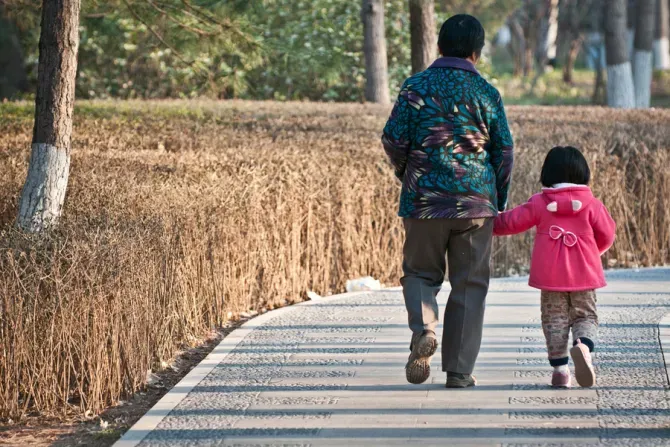
Rome Newsroom, Jun 18, 2021 / 15:00 pm (CNA).
In light of a report that China’s rapidly aging population has caused Chinese Communist Party (CCP) officials to consider eliminating government-imposed birth restrictions in 2025, a human rights advocate has asked: why wait?
After vigorously imposing a one-child policy from 1980 to 2016, CCP officials have discussed the possibility of doing away with all birth restrictions at the end of the party’s current five-year economic plan, according to a report by the Wall Street Journal on June 18.
Reggie Littlejohn, the president of Women’s Rights Without Frontiers, an aid and advocacy organization founded in response to forced abortion, forced sterilization, and sex-selective abortion of baby girls under the one-child policy, told CNA that she is continuing to call on the CCP to end all coercive population control policies immediately.
“If the CCP waits until 2025, how many more tens of millions of ‘extra’ pregnancies will be aborted — too often by force?” Littlejohn asked.
“Women should be free to give birth to their children — now,” she said.
Decades of government-enforced population control have left China with significant gender and age imbalances that have had far-reaching societal consequences, including a rise in sex trafficking and elderly suicide.
China’s most recent census results released in May revealed that 190.64 million people, or 13.5% of the country’s aging population, are over 65 years old.
In 2020, the country recorded the slowest population growth rate since the early 1960s, when the Great Leap Forward campaign by Mao Zedong, the founder of the Chinese Communist Party, resulted in a famine that killed 45 million people in four years.
The Chinese government announced last month that couples can now have up to three children in response to the sharp fall in the country’s birth rate.
The official state-run Xinhua News Agency said that the decision was taken as the government sought to ensure continued economic growth, national security, and social stability.
Littlejohn pointed out that the Chinese officials have not “repented of forced abortion or sterilization, but are considering this measure purely for demographic and economic reasons.”
“Since they are heading into a demographic disaster, why do they need to wait until 2025?” she asked.
The human rights advocate also questioned whether the reported future elimination of birth restrictions would be granted equally, noting that the CCP has recently conducted forced abortion and sterilization among the Uyghur population in Xinjiang.
“The three-child policy rule is that every couple is allowed to have three children. Therefore, it remains illegal for single women to give birth,” she said.
“If the CCP ‘eliminates’ all birth restrictions, will they finally let single women give birth? Or will the new rule be, ‘all couples can now have as many children as they want?’”
For more than three decades, Chinese authorities enforced a one-child policy with steep fines, sterilizations, and forced abortions, in an effort to curb what they perceived as excessive population growth.
The Catholic Church has consistently opposed such measures. In his 1967 encyclical Populorum progressio, Pope Paul VI spoke out against “drastic remedies to reduce the birth rate.”
“There is no doubt that public authorities can intervene in this matter, within the bounds of their competence,” he wrote. “They can instruct citizens on this subject and adopt appropriate measures, so long as these are in conformity with the dictates of the moral law and the rightful freedom of married couples is preserved completely intact.”
“When the inalienable right of marriage and of procreation is taken away, so is human dignity.”
China replaced the one-child policy with a two-child policy following concerns that the country’s population was aging rapidly. The change inspired a brief baby boom, but the birth rate fell again, with couples citing the high costs of raising children.
“Right now the problem in China is not that they have too many people. It is that they have too few young people to support their rapidly aging population and, even under the two-child policy, they are not getting the baby boom that they need to help with that situation or to help with the fact that their labor force is now declining,” Littlejohn told CNA in 2018.
In response to this shift, Women’s Rights Without Frontiers has expanded its mission to also serve elderly widows in China in need of support.
More than 35 million women in China will be over the age of 84 years old by 2050, while the number of women in their 20s and 40s will drop significantly, according to the United Nations Population Division.
Pope Francis said in a speech last month that low birth rates reveal the need to recover the idea that every life is an “unrepeatable gift.”
“Life is the first gift that each one of us received,” the pope said in his opening address at the General States of Birth event in Rome on May 14.
“We have received a gift and we are called to pass it on. And a child is the greatest gift for everyone and comes first,” he said.
“Let us help each other, dear friends, to rediscover the courage to give, the courage to choose life,” he said.
If you value the news and views Catholic World Report provides, please consider donating to support our efforts. Your contribution will help us continue to make CWR available to all readers worldwide for free, without a subscription. Thank you for your generosity!
Click here for more information on donating to CWR. Click here to sign up for our newsletter.




Leave a Reply